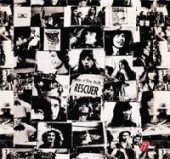Here are some free videos from A Bigger Bang Virtual Ticket.
Like what you see?
Sign-up for the FREE
RollingStones.com newsletter and enjoy instant access to every A Bigger Bang Virtual
Ticket video in full screen in the band's brand new Virtual Ticket media center!
As a newsletter subscriber, you'll also enjoy photos and set-lists from every
show on the A Bigger Bang world tour and the latest Stones news e-mailed directly to
your inbox.
Sign-up now!
Behind the Streets of Love
The Story Of Hurricane
Jumpin Jack Flash Live In Rio de Janeiro
The Rolling Stones Perform Sway Live In Glasgow
It's hard to overestimate the importance of the Rolling Stones in rock & roll history. The group, which formed in London in 1962, distilled so much of the music that had come before it and has exerted a decisive influence on so much that has come after.
Every album the group released through the early Seventies - from The Rolling Stones in 1964 to Exile on Main Street in 1972 -- is essential not simply to an understanding of the music of that era, but to an understanding of the era itself. Though the Stones were not overtly political in their early years, their obsession with African American music - from Robert Johnson, Muddy Waters and Howlin' Wolf to Chuck Berry, Marvin Gaye and Don Covay - struck a chord that resonated with the goals of the civil rights movement.
Soon, of course, the Stones - singer Mick Jagger, guitarists Keith Richards and Brian Jones, bassist Bill Wyman and drummer Charlie Watts, in those days - became synonymous with the rebellious attitude of that era. Songs like "(I Can't Get No) Satisfaction," "Street Fighting Man," "Sympathy for the Devil" and "Gimme Shelter" captured the violence, frustration and chaos of that era. For the Stones, the Sixties were not a time of peace and love.
The Stones were an indomitable force on the music scene, and they have continued to be to this day. Tattoo You (1981) added the classics "Start Me Up" and "Waiting on a Friend" to the Stones' repertoire, and took its prominent place among the Stones' most compelling - and most popular - later albums. Possibly the most underrated album of the Stones' career, Dirty Work finds the band at its rawest and most rhythmically charged, a reflection of the tumult within the band when it was recorded. True Stones fans have long worn their appreciation of Dirty Work as a hip badge of honor.
More significantly, though, the Stones have set a standard for live performance during this time. When the Stones began to be introduced on their 1969 tour as "The Greatest Rock and Roll Band in the World,' they were staking that claim on the basis of their live performances. It was almost fashionable for bands to withdraw from the road at that time - Bob Dylan and the Beatles had both done so. But the Stones set out to prove that writing brilliant songs and making powerful records did not mean that you were too lofty to get up in front of your fans and rock them until their bones rattled. The Stones' live shows - epitomized, of course, by Jagger's galvanizing erotic choreography - had earned the band its reputation in its earliest years, and that flame was being rekindled.
And that's the critical misunderstanding of the question, "Is this the last time?" that has been coming up every time the Stones have toured for close to forty years now. It's true that over the decades the Stones have been in the news for many reasons that have little to do with music - arrests, provocative statement, divorces, affairs, all the usual detritus of a raucous lifetime in the public eye. And there's no doubt that Mick Jagger is as famous a celebrity as the world has ever seen.
But, for all that, the Stones are best understood as musicians, and their own acceptance of that fact is what has enabled them to carry on so well for so long. For all the tabloid headlines, Mick Jagger is finally an extraordinary lead singer and one of the most riveting performers - in any genre - ever to set foot on a stage. Keith Richards is the propulsive engine that drives the Stones and makes their music instantly recognizable. Ron Wood is a guitarist who has formed a rhythmic brotherhood with Richards, but who also colors and textures the band's songs with deft, melodic touches. And Charlie Watts, needless to say, is one of rock's greatest drummers. He is both the rock that anchors the band, and the force that swings it. At once elegant in their simplicity and soaring in their impact, none of his gestures are wasted, all are necessary. He and Darryl Jones enliven the often-monolithic notion of the rock & roll rhythm section with an irresistible, unpretentious, jazz-derived sophistication.
Musicians live and create in the moment, and that's why fans still go see the Stones. Certainly there's also a catalogue of songs that only a handful of artists could rival. Surely there's also the desire to encounter a band that has played a pristine role in defining our very idea of what rock & roll is. But seeing the Rolling Stones live is to see a working band playing as hard as they can, and there's no last time for that.
- Anthony DeCurtis
